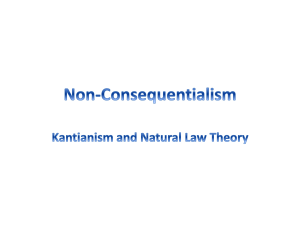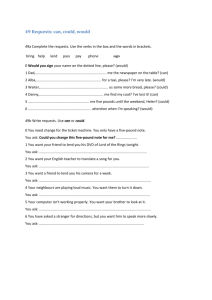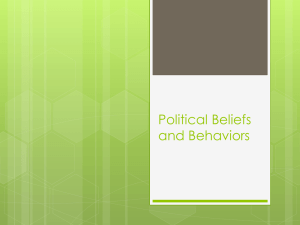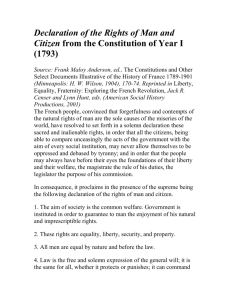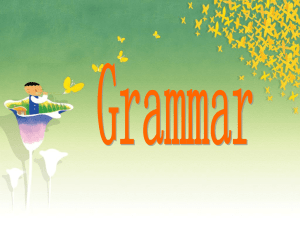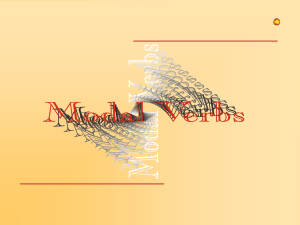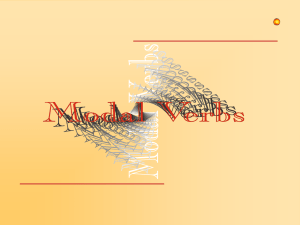香港中文大学 黄勇教授 大会报告 I. Introduction David Hume claims
advertisement
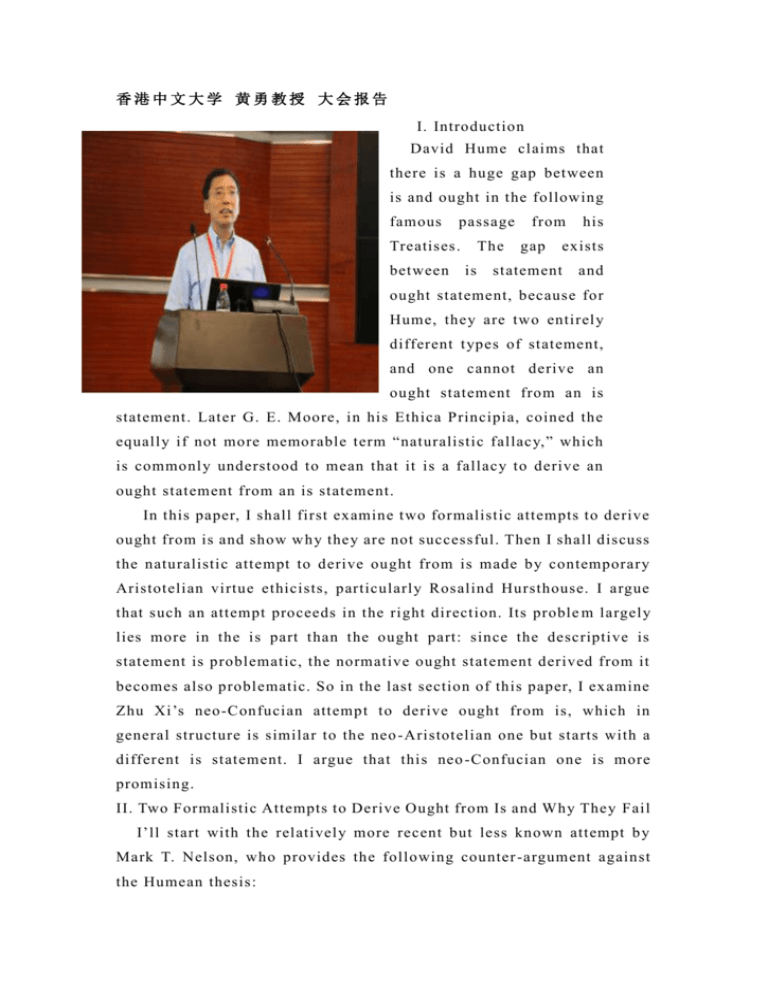
香港中文大学 黄勇教授 大会报告 I. Introduction David Hume claims that there is a huge gap between is and ought in the following famous passage Treatises . between The is from gap his exists statement and ought statement, because for Hume, they are two entirel y different t ypes of statement, and one cannot derive an ought statement from an is statement. Later G. E. Moore, in his Ethica Principia, coined the equall y if not more memorable term “naturalistic fallacy,” which is commonl y understood to mean that it is a fallacy to derive an ought statement from an is statement. In this paper, I shall first examine two formalistic attempts to derive ought from is and show w hy they are not successful. Then I shall discuss the naturalistic attempt to derive ought from is made by contemporary Aristotelian virtue ethicists, particularl y Rosalind Hursthouse. I argue that such an attempt proceeds in the right direction. Its proble m largel y lies more in the is part than the ought part: since the descriptive is statement is problematic, the normative ought statement derived from it becomes also problematic. So in the last section of this paper, I examine Zhu Xi’s neo-Confucian attempt to derive ought from is, which in general structure is similar to the neo -Aristotelian one but starts with a different is statement. I argue that this neo -Confucian one is more promising. II. Two Formalistic Attempts to Derive Ought from Is and Why They Fail I’ll start with the relativel y more recent but less known attempt b y Mark T. Nelson, who provides the following counter -argument against the Humean thesis: N1. “Bertie (morall y) ought to marry Madeline” is one of Aunt Dahlia’s beliefs. N2. All of Aunt Dahlia’s beliefs are true. N3. Therefore, Bertie (morall y) ought to marry Madeline. (Nelson 1995: 555) It is obvious that the conclusion is an ought statement and the first premise is a is statement. In appearance the second premise is also a is statement. However, if we say that “All of Aunt Dahlia’s beliefs are true,” Aunt Dahlia’s belief that “Bertie (morall y) ought to marry Madeline” is also rue; yet to say that Aunt Dahlia’s belief that “Bertie (morall y) ought to marry Madeline” is true simpl y means that “Bertie (morall y) ought to marry Madeline,” which is nevertheless an ought statement. So what Nelson achieves is not to derive an ought and is but derive an ought from an ought. To respond to our objection, Nelson makes a distinction between the specific and general interpretation of the second premise. However, even if emotivists are persuaded, they will realize that Nelson does not derive an ought from is, since the second premise itself is an (at least partiall y) ought statement. Now I want to tu rn to an earlier but much more famous attempt to derive ought from is, the one made by John R. Searle in his classical essay, “How to Derive ‘Ought’ from ‘Is’?” published in 1964. Searle starts with the following counter-example: (1) Jones uttered the wor ds “ I hereby promise to pay you, Smith, five dollars.” (2) Jones promised to pay Smith five dollars. (3) Jones placed himself under (undertook) an obligation to pay Smith five dollars. (4) Jones is under an obligation to pay Smith five dollars. (5) Jones ought to pay Smith five dollars. (Searle 1964: 44) I claim that Searle fails to derive an ought from is, since his very conclusion, despite the appearance of the word ought in it, is actuall y still an is or descriptive statement. W hat Searle’s whole argument amounts to is merel y this: someone who participates at the institution of promise ought to keep the promise; it says nothing whether the institution is good or not or whether one ought to be part of this institution. Since perhaps we all accept t he conclusion of Searle’s argument, its descriptive nature is not clear. However, we can construct a similar example like this. (1) Jones was a whole -hearted believer in Nazism; (2) And he found Smith hiding in a Polish famil y; (3) Smith was a Jew (4) Jones ought to kill Smith. Here, the conclusion follows, not because we think Jones ought to kill the Jew, but given the fact Jones participates at the institutional activities of Nazism, he ought to kill Smith, even though we might want to abolish the institution as we think Jones ought not to kill Smith. III. Hursthouse’s Ethical Naturalism: A Right Direction In contemporary virtue ethics, particularl y the neo -Aristotelian one, there is a new trend of ethical naturalism. In virtue ethics, the ought statement is often expre ssed by using the word “good,” and the ought not statement is often expressed by using the word “bad,” since statements containing “good” and “bad” are normative in the precisel y the same sense as statements containing “ought” and “ought not.” Thus the statement that “John is a good person” is equivalent to the statement that “one ought to be a person like John,” and the statement that “John is a bad person” is equivalent to the statement that “one ought not be a person like John.” In Hursthouse’s word, “wh at that entails is that, although you can evaluate and choose things according to almost any criteria you like, you must select the noun or noun phrase you use to describe the thing you are calling good advisedl y, for it determines the criterion of goodnes s that are appropriate” (Hursthouse 1999: 195). “Good” is similar to “small” but different from “red” and so it is also an attributive term. In other words, we don’t have an independent and uniform criterion of goodness that can be applied to anything. Ins tead, our criterion of goodness must be specific to the thing that we describe as good. In other words, the normative conception of good must be derived from a descriptive conception of the thing regarded as good. First we examines our evaluation of pl ants. Here, “we evaluate two aspects—parts and operations —in relation to two ends” (Hursthouse 1999: 198). The two ends are (1) individual survival through the characteristic life span of such a member of such a species and (2) continuance of the species. (Hursthouse 1999: 198). So a good plant is one that is well fitted with respect to its parts and operations in terms of both its individual survival and the continuance of its species. In other words, a good plant is one whose two aspects serve its two end s well. Hursthouse then moves to our evaluation of animals, where two additional aspects and two additional ends are introduced. The first new aspect (the third aspect) is acting or doing in contrast to merel y reacting as is found in plants. The second n ew aspect (the fourth aspect) is a certain psychology of emotions and desires. With these two new aspects, there are not onl y more complex ways of realizing the two ends; but there are also two new ends to be served. The first new end (the third end) is the “characteristic freedom from pain and characteristic pleasure or enjoyment” (Hursthouse 1999: 199), as animals seek both freedom from pain and enjoyment of pleasure, while plants do not. The second new end (the fourth end), particular in social animals s uch as wolves and bees, is “the good functioning of the social group.” In Hursthouse’s view, evaluation of human beings have no new end but a new aspect: rationalit y. It is primarily in virtue of our actions from reason that we are ethicall y good or bad human beings. In the person with the virtues, these emotions will be felt on the right occasions, towards the right people or objects, for the right reasons. It is interesting to see that all aspects that Hursthouse thinks are ethicall y relevant, other than rationalit y, are also present in animals. However, why do we not make ethical evaluations of animals and regard them as either morall y virtuous or vicious? The reason for Hursthouse is that rationalit y, the unique aspect in human beings, is important not onl y because it is a new aspect to be evaluated, but also because it affects all other aspects to be evaluated in a human being. As a matter of fact, Hursthouse claims that full virtue involving feeling emotions is generall y impossible without the influence of reason. IV. Problem with Hursthouse’s Neo -Aristotelian Approach There is an Objection to Hursthouse ’s argument. While Hursthouse ’s ethical naturalism can indeed respond to McDowell ’ s objection on behalf of a rational wolf, it is still a questi on whether it can respond to Watson’ s objection on behalf of a social gangster: “ can an objective theory reall y establish that being a gangster is incompatible with being a good human being? ” (Watson 1997: 67). V. Zhu Xi’s Neo -Confucian Naturalism (xing 性 ): A More Promising Approach As we have seen, Hurshouse’s attempt to derive ought from is is in the right direction. Its problem largel y lies in the is part: its does not provide an adequate description of what human nature is. In this section, I shall argue that Zhu Xi’s neo -Confucian attempt to derive ought from is is largel y consistent with Hursthouse’s neo -Aristotelian one. The difference is that he provides a different is statement, i.e., a different description of what human nature is. Following the Mencian line of Confucianism, Zhu Xi regards human nature not merel y as something that human beings are born with but as something characteristic of human beings, something that distinguishes human beings from other beings. In this sense, he still agrees w ith Aristotle. The question is what distinguishes human beings from other beings. Philosophers in the Western tradition have almost unanimously accepted the view that it is rationalit y, although they may disagree on precisel y what rationalit y is. When Zhu Xi claims that human nature is virtuous, he does not mean that every individual human being is actuall y already virtuous. There are people, actuall y many people, who are not virtuous, and in this sense many people are not charac teristicall y human beings. They are defective human beings. In this sense, while Zhu Xi disagrees with Hursthouse on what is characteristic of human beings, he would certainl y agree with her when she says that “characteristic” is not a statistical notion. In other words, while it certainl y does not mean that all humans are going on in the characteristicall y human way, it also does not necessaril y mean that most human beings are going on in the characteristicall y human way. To determine whether a way is char acteristic of the human species is to see what all humans can do (not actuall y do) that makes the human species different from other species. So, as Hursthouse states, the notion of “characteristic” is “avowedl y normative and is clearl y going to yield judgments to the effect that many human beings are not going on ‘in the way characteristic of the species’ and are thereby defective human beings” (Hursthouse 1999: 223). It is in this sense that there is no contradiction at all between Zhu Xi’s claim that hum an nature is virtuous and the acknowledgement that some (and actually many) human beings are not virtuous. Zhu Xi onl y disagrees with Hursthouse on what is characteristic of the human species. While for Hursthouse the wa y characteristic of human beings is rationalit y, for Zhu Xi it is tui, the abilit y to extend the four natural qualities, the very abilit y that makes these four natural qualities virtues in human beings. Thus, as far as the four natural qualities are not full y extended in a human being, this human being is more or less ethicall y defective, just as a person who does not have the vision characteristic of the human species is more or less physicall y defective. More importantl y, for Zhu Xi, while a person who is physicall y defective to a certain degree may never be able to gain the physical abilit y characteristic of human beings, a person who is ethicall y defective, however serious it is, can always regain the ethical way characteristic of being human, as long as the person is willing to make a strong enough effort of tui, since the ethical way characteristic of human beings, while not a way lived by all or even most human beings, is a way that all human beings can have and ought to have in order to become characteristicall y human beings. This can also explain why we do not condemn a person for his/her physical defects as we do for his/her ethical defects.
